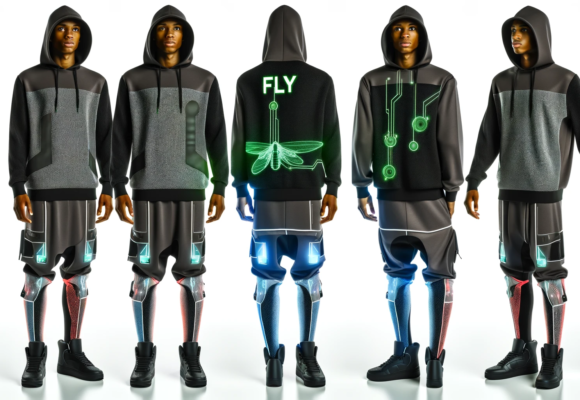The influence and impact of Artificial Intelligence (AI) on the clothing and textile industry over the next ten years are anticipated to be transformative, with profound implications for production processes, supply chain management, consumer interaction, and sustainability efforts. As AI technologies continue to evolve and integrate into various facets of the industry, several key areas are expected to see significant changes:
Production Innovation and Efficiency:
- Automated Design and Customization: AI-driven tools will enable more sophisticated pattern recognition and design capabilities, allowing for the creation of customized clothing at scale. This could lead to a shift towards more personalized fashion, reducing waste associated with mass production.
- Smart Manufacturing: AI is expected to further streamline manufacturing processes through predictive maintenance of machinery, optimized resource allocation, and real-time quality control. These advancements could significantly reduce production times and costs while increasing efficiency and output quality.
Supply Chain and Inventory Management:
- Enhanced Forecasting and Demand Prediction: With AI’s advanced data analytics, fashion brands will be able to predict trends and consumer demand more accurately, minimizing overproduction and unsold inventory. This could lead to a more sustainable fashion industry with reduced waste.
- Supply Chain Optimization: AI will enable more efficient supply chain management by optimizing logistics, predicting and mitigating disruptions, and ensuring timely delivery of materials. This will not only reduce costs but also enhance the flexibility and resilience of the supply chain.
Consumer Experience and Engagement:
- Personalized Shopping Experiences: AI technologies, including machine learning and natural language processing, will offer consumers highly personalized shopping experiences, from product recommendations to virtual fitting rooms, improving customer satisfaction and loyalty.
- Enhanced Customer Interaction: Through AI-powered chatbots and virtual assistants, brands will provide 24/7 customer service, offering personalized advice and support. This level of engagement could redefine brand-consumer relationships.
Sustainability and Ethical Practices:
- Sustainability Analytics: AI will play a crucial role in analyzing and optimizing the environmental footprint of clothing production, from water usage to carbon emissions. This could help brands achieve greater sustainability and meet increasingly stringent regulatory standards.
- Circular Economy Facilitation: By enabling efficient sorting and recycling processes, AI could support the development of a more circular economy within the textile industry, where materials are reused and recycled, reducing waste and environmental impact.
Challenges and Considerations:
- Job Displacement and Skill Transformation: The automation of certain tasks may lead to job displacement, necessitating the re-skilling of workers for new roles created by AI technologies.
- Data Privacy and Security: As AI systems require vast amounts of data, ensuring the privacy and security of consumer and operational data will be paramount.
- Ethical AI Use: Ensuring that AI is used ethically, particularly in terms of labor practices and environmental impact, will be crucial for brands seeking to maintain consumer trust.
In summary, the next ten years are likely to witness a significant impact of AI on the clothing and textile industry, driving innovations that enhance efficiency, personalize consumer experiences, and promote sustainability. However, these advancements will also require careful navigation of ethical, environmental, and workforce-related challenges.


 18 Feb 2024
18 Feb 2024
 Posted by Watchdog Ent.
Posted by Watchdog Ent.  0 Comment
0 Comment 









